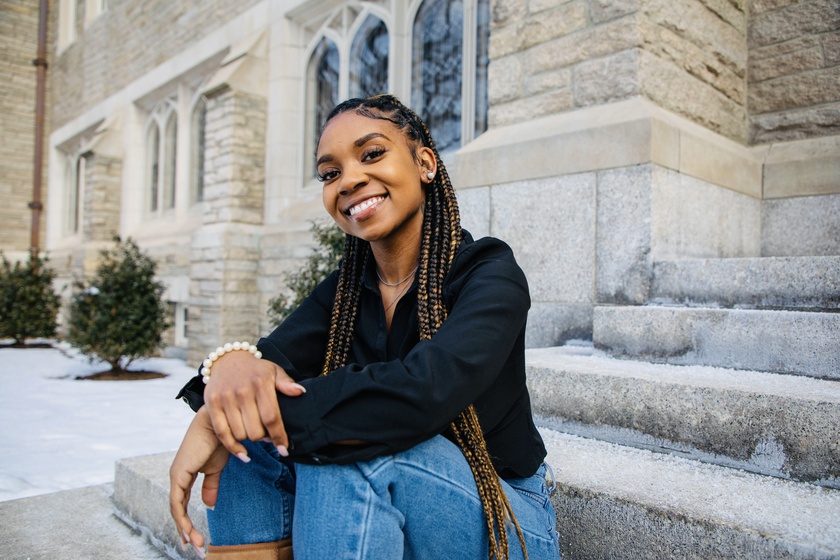{shortcode-a69ec7b14491284f3a6deffe649d970753f3c032}
Overlapping disasters marked Harvard Divinity School master’s student Aliyah S. Collins’s final semester as an undergraduate at Fisk University, a historically Black university in Nashville. The onset of Covid-19 lockdowns followed a series of devastating tornadoes in the area, leaving Fisk without power and Collins struggling to juggle a part-time job, classes, and the stress of moving.
This experience, in part, was the inspiration for the Eco-Healing Project, which Collins founded last fall to “help HBCU students heal and recover from the impact of climate disasters.”
Collins notes that there is a unique, intersectional impact of climate disasters for HBCU students, especially those who are low-income. “A lot of students face or experience a lot of PTSD, stress, depression, just having to navigate the climate disaster,” Collins says.
Collins’s work on the Eco-Healing Project has a distinctly spiritual focus. Inspired by her education and interest in ecospirituality, she centers planting and gardening as part of the healing process.
“It’s not just like you’re putting seeds in the ground and watering those seeds,” Collins says. “You’re being intentional, you’re being mindful around these same practices we do with the Earth. These are the same practices we could do with ourselves.”
Today, Eco-Healing is planning to run a pilot program at Bennett College, an all women’s HBCU in Greensboro, North Carolina. The HBCU established a Green Team two years ago, and Collins hopes that Eco-Healing can supplement and support this effort by raising money for it and bringing ecospirituality and ecotherapy programming to students. These events range from mindful gardening and nature walks to talks from activists and scholars.
Three months ago, Tom’s of Maine, a subsidiary of Colgate-Palmolive that sells toothpaste and deodorant, selected Collins as one of “five young BIPOC environmental leaders” as part of its new “Incubator” program. To help “amplify” her message, Collins will receive $20,000 in funding as well as the company’s mentorship and support.
Collins has been interested in theology since her sophomore year of college, when she was accepted into the Diversity and Explorations Program at Harvard Divinity School. Collins became a Mellon Mays fellow and began research into ecotheology, focusing on the relationship between religion and nature, particularly in light of environmental concerns.
In college, Collins also explored ecowomanism — a framework that she says “ties the issues of the Earth to the issues that Black women are facing and sees them as one and the same.” She also took inspiration from Toni Morrison’s “Beloved” and “Song of Solomon” and Octavia E. Butler’s “Parable of the Sower.”
When Collins first came to HDS, she intended to focus on policy work and Pan-Africanism. Her interests began to evolve, though, and Collins found herself once again interested in eco-spirituality, in part because of her experience working at a multi-faith center in Framingham.
She connected with people from different faiths and traditions, observing a connective tissue in the spiritual relationships people had with the natural world. She came to see how a tree, which she used as an example, can be a spiritual object with disparate meanings across religious traditions.
“A tree is not just a tree,” she says, “a tree is a living thing that’s connected with us.”
Collins believes that access to nature is essential. She recalls a memory from last summer that helped spark this project: She was living in Chicago and often went to a little park that hugged Lake Michigan to escape her troubles. But she learned that there were Black kids in Chicago trapped in “concrete jungles” who had yet to go to this lakefront.
Collins believes students at Fisk and other HBCUs, which are “oftentimes in lower-income communities and neighborhoods,” have the same experience.
“Lower-income neighborhoods, underserved neighborhoods, obviously don’t have access to nature spaces that are close,” she says. “Of course, that’s going to have a negative impact on your mental health.”
The mission of EcoHealing is to provide “equitable access to nature so that students can be able to use that to heal,” she says.
“Climate justice is racial justice,” Collins says. “They go hand in hand. They are the same.”
As for the future of EcoHealing, Collins is hoping to expand the project to more HBCUs and incorporate it as a nonprofit.
“It is not for the weak,” Collins says of the work. “It’s gonna be a long journey just trying to get this up. But, thankfully, I have a lot of help.”
— Magazine writer Ciana J. King can be reached at ciana.king@thecrimson.com.


